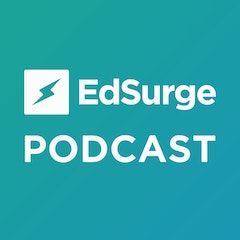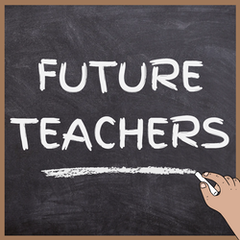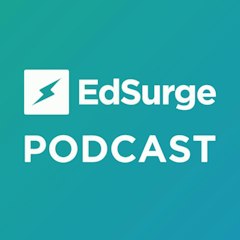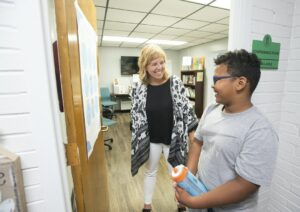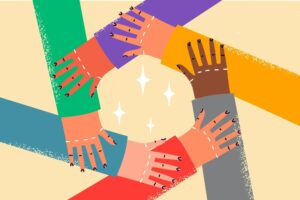
On a recent walk after spending a day working with middle school teachers on engagement strategies, I was listening to the “We Can Do Hard Things” podcast. The guest, Allison Russell, was talking about the emotional intelligence of young people and mentioned that she’d just learned that her daughter was part of Generation Alpha, which refers to people born after 2010. This was the first time I heard this term, which is surprising given that my own two children and many of the children I support are of this generation.
I had questions and I wanted to know more. As I learned more about the attributes of the youngest generation, I began to think about the implications for educators.
I’ve spent two decades as a literacy specialist coaching teachers and providing professional development and I’ve seen a lot of transition in the field. I’ve supported teachers as they navigate frustration about rapidly changing curricular trends and assessment requirements, figure out where they stand on teaching reading, and — over the past few years — learn how to reach students during and after the height of the pandemic.
Currently, I coach teachers across 18 K-12 schools in the Campbell Kapolei Complex Area in Ewa Beach and Kapolei Hawaii. In conversations with teachers and leaders about the current problems in our schools including academic delays and behavioral challenges, COVID-19 is most often pointed to as the culprit.
In my heart, I’ve known for some time that the challenges facing our youth go beyond the pandemic. Learning about what makes Generation Alpha so unique has helped me understand how we might shift our practices accordingly to lean into the strengths of this generation.
Understanding Generation Alpha
The name “Generation Alpha,” was coined by Mark McCrindle, a generational researcher and corporate consultant in Australia. According to McCrindle, the children of Generation Alpha began being born in 2010, the year the iPad and Instagram were launched. From their earliest years, he says, “they have been screenagers.”
In a 2015 interview with the New York Times, when asked about the name “Generation Alpha,” McCrindle said “It didn’t make sense to go back to A,” noting that it’s the first generation to be fully born in the 21st century. “They are the start of something new, not a return to the old,” he added.
McCrindle was right. These children are unlike any generation before them, which may be said of all generations; however, it is indisputable that the children of Gen Alpha have access to more information and connectivity at an earlier age than any other generation, and we need to consider that as we educate them.
This generation was 10-years-old or younger when the world shut down due to COVID-19. They experienced a world besieged by a virus and now they carry an ingrained understanding that the action of one can affect the well-being of many.
These kids are arguably the first generation who had devices in their hands before they could walk. They intrinsically understand how connected the world is, whether through witnessing a virus moving through the globe rapidly, communicating with family many miles away on FaceTime, or developing close friendships through social media with people they may never meet in person. These truths are simply part of how the Generation Alpha’s worldview is being formed.
Most of the oldest students of this generation are now in middle school. As they move through adolescence, transitioning from childhood to adulthood, they're finding ways to leave their mark on the world. This year, I’ve been working closely with middle school teachers at multiple schools and I’ve seen that they’re struggling more than ever. I have been part of numerous conversations about how these students have a more challenging time conforming to the current norms of schooling. I’ve heard many teachers and administrators talk of learning loss, behavioral challenges and developmental stagnation due to the pandemic. And I’ve heard repeatedly that engagement is low. Teachers are frustrated that students do not seem to have the academic or social skills expected in middle school and often share that their students do not care about learning.
Somehow, it always seems to come back to the years students missed during the pandemic and how the loss of those previous learning experiences is preventing them from being successful now.
But, I’m curious whether something else is also at play. I wonder what this generation knows that we aren’t measuring? What have they learned that is not demonstrated on the tests they take? How are educators creating conditions to prepare them to mold this new world they were born into?
Leaning Into the Strengths of This Generation
My focus this year with middle school teachers has been on learner engagement. Developing a greater understanding of the unique strengths of Generation Alpha has helped.
This generation of learners can access whatever information they want, which may be the reason many educators I work with are noticing they are no longer engaged in learning at school. Many of these kids (falsely) believe that there is nothing their teacher can teach them that they cannot discover online. So, the ever present challenge of making learning relevant has become even more difficult.
One way to create relevance and engagement for our students is to lean into what they value. To help educators do that, I often ask them: “Do we know what our students value? If not, how can we find out?” One snag for middle school teachers is that many of their students are still figuring out who they are and what they value, so our role is to support them in that exploration as we craft learning experiences.
As I’ve worked alongside these teachers to consider what it means to successfully reach their students, we’ve discussed how to leverage the strengths of this generation of learners, including connectedness, curiosity, a capacity for empathy and a desire for change.
This generation has a deep sense of global connection, which teachers can tap into. The teachers I coach say their students use technology to effortlessly connect with people across the world. Designing assignments that offer students opportunities to create something they can share with a wider audience — where their voices can extend beyond the classroom — has increased engagement.
Curiosity is another Generation Alpha attribute that I encourage educators to build upon. Having information at their fingertips has made these kids curious and we need to create space for the big questions they have. Building more choice into learning allows students to explore their curiosity. When I work with educators, we often begin with a lesson plan that has been taught many times before and consider how we might tweak it to provide more choice. Sometimes that means having more ownership over what they learn. Other times it means getting a say in how they learn or how they demonstrate what they understand.
Although it may not seem like it through the angst of adolescence, most of the middle school teachers I work with say their students have a large capacity for empathy and a desire for change. In part, that’s due to their stage of development, but it’s also related to their connectivity. Through their digital worlds, these students are exposed to more people and ideas than generations before them. That, of course, comes with drawbacks. For example, I talk a lot with educators about how their students' social lives look quite different than ours may have, and we must teach them how to be cautious online and how to be good digital citizens. But it’s also due to these rich digital lives that these students are aware of issues beyond their neighborhoods and communities, and why many are passionate about solving a variety of challenges, such as environmentalism and homelessness. Tapping into what our students care about most can help us teach them in a way that will empower them to make change.
These students are at their best when they believe that they can fight for what is right, and win. As educators, although we cannot fully prepare them for what is to come because it is deeply uncertain, we can walk alongside them, share our life experiences, knowledge and wisdom with them. But it’s important to honor their paths and resist the impulse to force them on the well-traveled road. After all, the path they will follow is one we have yet to traverse.
In the book “Becoming Wise,” Krista Tippett, a journalist and 2014 winner of the National Humanities Medal, writes, “The interesting and challenging thing about this moment is that we know the old forms aren’t working. But we can’t yet see what the new forms will be.” What if children of Generation Alpha have insights into these new forms? Are we equipping them with the skills and confidence to bring these new forms to life in beautiful, joyous and just ways?
As the Alpha generation goes through the transformation of adolescence, we must be there to nurture their vision and foster their power as they forge what comes next.
- SEO Powered Content & PR Distribution. Get Amplified Today.
- PlatoData.Network Vertical Generative Ai. Empower Yourself. Access Here.
- PlatoAiStream. Web3 Intelligence. Knowledge Amplified. Access Here.
- PlatoESG. Carbon, CleanTech, Energy, Environment, Solar, Waste Management. Access Here.
- PlatoHealth. Biotech and Clinical Trials Intelligence. Access Here.
- Source: https://www.edsurge.com/news/2024-02-02-what-educators-need-to-know-about-generation-alpha
- :has
- :is
- :not
- :where
- 2010
- 2014
- 21st
- a
- About
- academic
- access
- According
- accordingly
- across
- Action
- added
- administrators
- affect
- After
- age
- All
- allows
- alongside
- Alpha
- also
- Although
- always
- an
- and
- Another
- any
- ARE
- AREA
- arguably
- AS
- ask
- assessment
- assignments
- At
- attributes
- audience
- Australia
- aware
- away
- back
- BE
- Beach
- beautiful
- because
- become
- been
- before
- began
- begin
- behavioral
- being
- believe
- BEST
- Beyond
- Big
- book
- born
- bring
- build
- Building
- but
- by
- campbell
- CAN
- cannot
- Capacity
- care
- carry
- cautious
- Century
- challenge
- challenges
- challenging
- change
- changing
- Children
- choice
- Citizens
- classroom
- Close
- closely
- coach
- coaching
- COM
- come
- comes
- communicating
- Communities
- complex
- conditions
- confidence
- Connect
- connected
- connection
- Connectivity
- Consider
- consultant
- conversations
- Corporate
- could
- course
- COVID-19
- craft
- create
- Creating
- curiosity
- curious
- Current
- day
- decades
- deep
- deeply
- delays
- demonstrate
- demonstrated
- designing
- desire
- developing
- Development
- developmental
- Devices
- different
- difficult
- digital
- digital worlds
- discover
- discussed
- do
- down
- drawbacks
- due
- during
- Earlier
- earliest
- educate
- educators
- effortlessly
- else
- Empathy
- empower
- encourage
- engaged
- engagement
- Even
- EVER
- example
- expected
- experienced
- Experiences
- exploration
- explore
- exposed
- extend
- FaceTime
- facing
- family
- few
- field
- fight
- Figure
- Find
- finding
- fingertips
- First
- First Generation
- first time
- Focus
- follow
- For
- Force
- forge
- formed
- forms
- Foster
- friendships
- from
- frustrated
- frustration
- fully
- Gen
- generation
- generational
- generations
- getting
- given
- Global
- globe
- Go
- Goes
- good
- greater
- Guest
- had
- Hands
- Hard
- Have
- having
- hawaii
- he
- heard
- Heart
- height
- help
- helped
- her
- homelessness
- honor
- How
- How To
- However
- HTML
- HTTPS
- i
- ideas
- if
- implications
- important
- in
- Including
- increased
- information
- ingrained
- insights
- Intelligence
- interesting
- into
- intrinsically
- iPad
- issues
- IT
- journalist
- jpg
- just
- kids
- Know
- knowledge
- known
- knows
- large
- launched
- leaders
- LEARN
- learned
- learner
- learners
- learning
- Leave
- lesson
- Leverage
- Life
- like
- Listening
- literacy
- Lives
- longer
- Look
- loss
- Lot
- Low
- made
- make
- MAKES
- Making
- many
- mark
- May..
- me
- means
- measuring
- Media
- Meet
- mentioned
- Middle
- might
- missed
- moment
- more
- most
- move
- moving
- multiple
- must
- my
- name
- National
- Navigate
- Need
- never
- New
- New York
- New York Times
- news
- next
- no
- norms
- nothing
- noting
- now
- numerous
- nurture
- of
- offer
- often
- Old
- oldest
- on
- ONE
- online
- opportunities
- or
- Other
- our
- out
- over
- own
- ownership
- pandemic
- part
- passionate
- past
- path
- paths
- People
- person
- plan
- plato
- Plato Data Intelligence
- PlatoData
- Play
- podcast
- power
- practices
- Prepare
- present
- preventing
- previous
- problems
- professional
- provide
- providing
- Questions
- quite
- rapidly
- RE
- reach
- reason
- recent
- refers
- related
- relevance
- relevant
- REPEATEDLY
- Requirements
- researcher
- resist
- return
- Rich
- right
- road
- Role
- Said
- say
- says
- School
- Schools
- see
- seem
- seems
- seen
- sense
- Share
- shift
- shut
- Shut down
- simply
- skills
- snag
- So
- Social
- social media
- Social Skills
- Solving
- some
- something
- sometimes
- Space
- specialist
- Spending
- spent
- Stage
- STAGNATION
- stand
- start
- Still
- strategies
- strengths
- Struggling
- Students
- successful
- Successfully
- such
- support
- Supported
- surprising
- Take
- Talk
- talking
- Tap
- tapping
- taught
- teacher
- teachers
- Technology
- term
- tests
- than
- that
- The
- The New York Times
- the world
- their
- Them
- There.
- These
- they
- thing
- think
- this
- this year
- those
- Through
- time
- times
- to
- Transformation
- transition
- transitioning
- traverse
- Trends
- tweak
- two
- Uncertain
- understand
- understanding
- unique
- unlike
- upon
- us
- use
- value
- variety
- virus
- vision
- VOICES
- walk
- want
- wanted
- was
- Way..
- ways
- we
- were
- What
- What is
- whatever
- when
- whether
- which
- WHO
- why
- wider
- will
- win
- winner
- wisdom
- WISE
- with
- witnessing
- wonder
- Work
- worked
- working
- world
- world’s
- year
- years
- yet
- york
- young
- Younger
- Youngest
- youth
- zephyrnet


